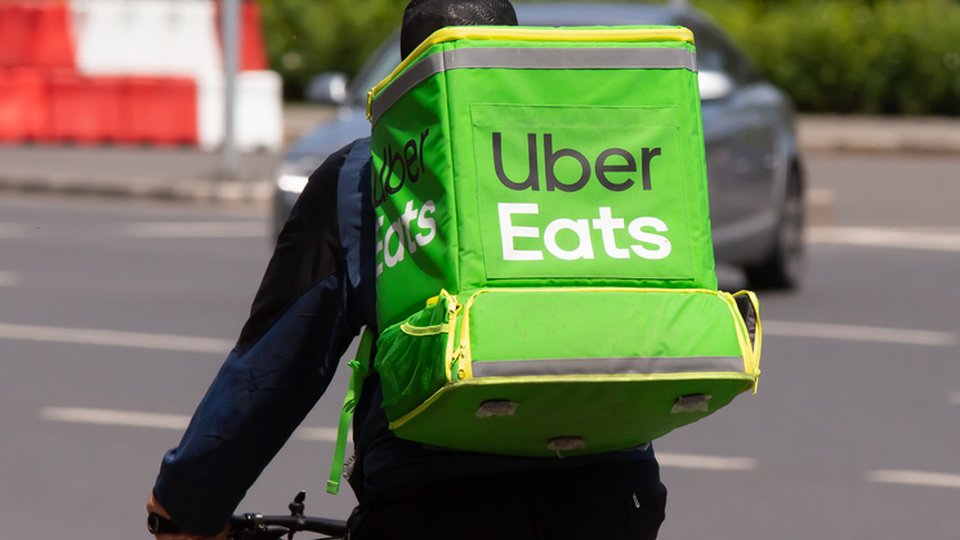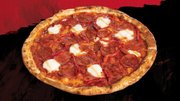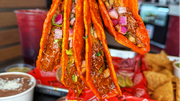Delivery
Did Uber Eats' Super Bowl ad miss the mark?

March 11, 2021 by Vanessa Montalbano
When Willy Solis, an Uber Eats driver from Denton, Texas, saw the company's $5.5 million commercial on Super Bowl night, he thought it was "kind of disgusting."
The commercial, which featured Cardi B and "Wayne's World" actors Mike Myers and Dana Carvey, was part of the company's "eat local" campaign, which it created to help restaurants struggling amid the pandemic.
"Uber is positioning itself as an advocate for local restaurants when it is taking their money," Solis said. "If Uber really wanted to help, it would permanently lower its restaurant fees."
Typically, Uber Eats charges restaurants a30% fee for deliveries, which is on top of a mandatory $350 activation fee, a hefty profit if you ask some brands.
Days before the big game, however, on Feb. 3, Uber Eats published a press release announcing that it was offering $0 delivery fees for customers buying from local restaurants from Feb. 3 to Feb.7.
"We're here for restaurants at Uber Eats — as we have been since the start of the health crisis," Stephane Ficaja, head of Uber Eats and delivery for the United States and Canada, said in the release. "Today we're committing $20 million through various initiatives at a critical time, renewing promises we've made on pricing, and will remain focused on our partners' success in the months ahead."
Uber Eats did not respond to FastCasual's request for comment about the commercial, but Katie Wells, a postdoctoral research fellow at the Kalmanovitz Initiative for Labor and the Working Poor at Georgetown University, said the tactics used in Uber Eats' ad were commonly used by other big businesses.
"They pick a popular mantra and use it to appear to have a woke platform," she said during a phone interview.
The dueling health and economic crises we currently face have boosted the profits of app-based delivery companies exponentially, according to Second Measure, a technology company that analyzes transactions to discuss company performance and consumer behavior. The same data report held that by the end of last year, 28% more people in the United States were using on-demand services than in 2019.
The success of these apps is likely the result of thousands of unemployed people searching for work during the pandemic, customers wanting to receive meals quickly without leaving the safety of their homes and restaurants needing to cultivate partnerships so long as they want to stay open without the service of in-house patrons.
"Restaurants have no recourse than to join Uber and other conglomerates," Solis said. "It's impossible to compete."
Torsten Kunert, a recruiter for Uber and a self-proclaimed voice for drivers in Los Angeles, called the the ad a missed opportunity.
"(It was a )slap in the face for those who know well the reality of this thing," said Kunert, who spends a lot of time teaching drivers how to maximize their earnings on his YouTube channel, Rideshare Professor.
Wells called the relationship between Uber Eats and restaurants "predatory," saying that it was "just another way for companies to showcase their power over those in vulnerable positions."
Solis agreed. He said apps like Uber "make money off the backs of others."
On Friday, Feb. 12, for example, Kunert said one of his clients, an Uber Eats driver in Massachusetts, logged on to the app for an hour and made two deliveries. Altogether, they totaled $30.48. Of that, $22.89 was paid directly to Uber, leaving the driver with just $7.59 of earnings for that hour of work before a potential tip was added — most of it going toward replenishing gas for his vehicle.
The hourly minimum wage in Massachusetts as of Jan. 1, 2021 was $13.50.
"These are slim profit margins," Kunert said of the drivers' scenario. "They are testing how much they can extract from both local drivers and local restaurants during this pandemic."
But not everyone in the independent restaurant or delivery business agrees with Kunert's assessments.
Surviving the pandemic with third-party help
A manager of Uncle Julios: Mexican From Scratch in Bridgewater, New Jersey, said his restaurant wouldn't have been able to survive the pandemic without its third-party delivery partners, including Uber Eats, DoorDash, Postmates and Grubhub.
"We don't have our own drivers because it is a liability, but to-go food remains a priority," he said. "So far this week we earned $17,000 off of the companies. I'd say about 79% of our takeout is from third-party companies."
He said the restaurant has had consecutive issues with Postmates, which was acquired by Uber Eats in November.
"There have been so many times where drivers don't pick up the food and then customers call us with complaints. It's not a good look for us," he continued. "But we can't cut ties with them because of our contract."
Nia Johnson, a communications and programs associate at the American Economic Liberties Project and organizer for Protect our Restaurants, said these types of stories are not isolated. Her organization has noticed a strain between local restaurants and customers due to third-party interference.
"Restaurant workers work so hard to foster community with their customers," she said in a phone interview. "They are social hubs and they are being destroyed by predatory services that intentionally shrink the market."
Another one of her fears as the on-demand industry gains momentum is that while big corporations are paying millions to shape a narrative, people's stories are being lost.
"They are deceiving consumers into thinking that they are supporting local," she said. "The fees they charge are a deafening blow to the entire community."
Because delivery apps provide a service that is now essential, Johnson said brands must hold them publicly accountable while learning to work with them — as they are likely here for the long haul.
 ChatGPT
ChatGPT Grok
Grok Perplexity
Perplexity Claude
Claude














